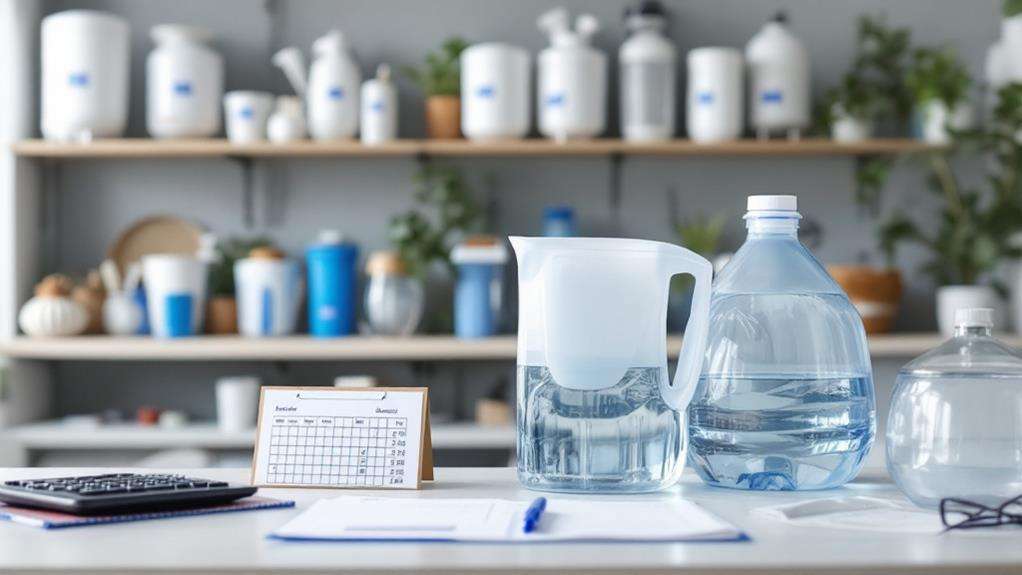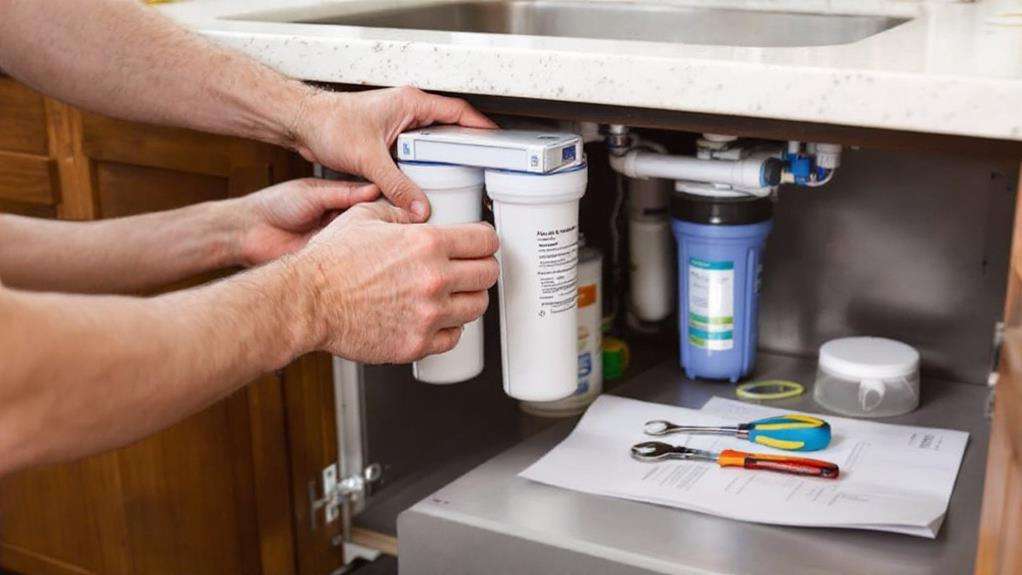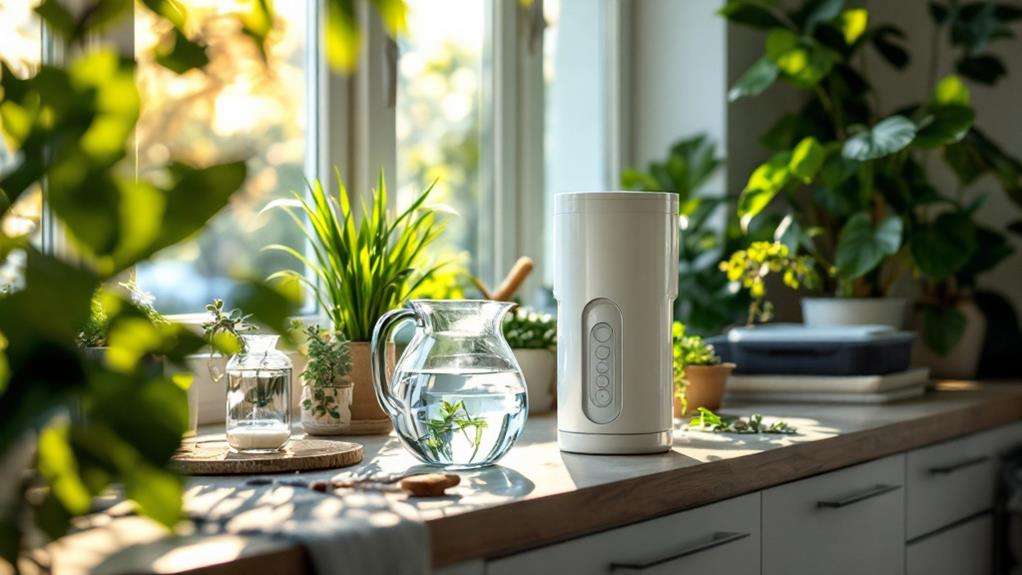The Ultimate Guide to Choosing the Right Water Filtration System for Your Home
Selecting the right water filtration system for your home involves understanding your water quality requirements and comparing various options. You'll want to contemplate factors like contaminant elimination, flow rate, and filter life expectancy. Assess your spatial constraints and budget, including long-term maintenance expenditures. Common types include pitcher filters, faucet-mounted systems, under-sink filters, and whole-house solutions. Each has its pros and cons in the context of effectiveness, convenience, and installation complexity. Don't forget to look for certifications from reputable organizations like NSF International. By meticulously considering these factors, you'll be well-equipped to make an informed decision that guarantees clean, safe water for your family.
Understanding Water Filtration Basics
Water filtration is your key to cleaner, safer water at home. It's a process that removes impurities, contaminants, and unwanted substances from your water supply, improving its quality and safety for drinking, cooking, and other household uses. You'll find various methods available, with the most common being carbon filters, reverse osmosis, and ultraviolet disinfection.
When choosing a water filtration system, you'll need to evaluate several factors. These include your specific water quality issues, desired flow rate, filter capacity, and maintenance requirements. It's also indispensable to look for systems with proper certification to ensure they meet industry standards.
You have two main options: whole-house water filters that treat all the water entering your home, providing clean water at every tap, or point-of-use filters that address specific issues at individual outlets. Whichever you choose, proper installation and regular maintenance are essential for paramount performance.
Types of Water Filtration Systems
Now that you understand the basics of water filtration, let's investigate the various types of systems available for your home. There are several options to choose from, each with its own pros and cons.
Pitcher filters are affordable and space-saving, but they require frequent refilling. Faucet-mounted filters are easy to install but may not fit all faucets. Countertop filters are convenient for renters and less prone to clogging, but they can clutter your workspace. Under-sink filters offer discreet, high-capacity filtration but require plumbing modifications. Reverse osmosis systems provide powerful filtration but are slow and water-intensive.
When selecting a water filtration system, consider your water usage, specific contaminants, and installation requirements. Pitcher and faucet-mounted filters are great for small households, while under-sink and whole house water filters suit larger families. Carbon filters effectively remove chlorine and improve taste, while reverse osmosis tackles a wider range of contaminants.
Remember that each system requires different levels of maintenance and has varying impacts on water quality. By evaluating these factors against your needs and budget, you'll be able to choose the right water filtration system for your home.
Assessing Your Water Quality Needs

Before selecting a filtration system, it's crucial to understand your specific water quality needs. Start by obtaining a water quality report from your local water supplier. This report provides pivotal information about contaminants found in your area's water supply.
For a more detailed analysis, consider using a home water testing kit. These kits can identify specific contaminants and measure levels of dissolved solids in your water. Pay close attention to any substances that exceed safety standards or affect taste and odor.
Next, assess your household's water consumption patterns. Do you use water primarily for drinking and cooking, or do you need filtered water for bathing and laundry as well? This will help determine the capacity and type of filtration system you'll require.
Consider any specific health concerns or sensitivities your family may have. Some individuals require water free from certain contaminants due to medical conditions or allergies.
Comparing Filter Performance Metrics
When evaluating water filtration systems, it's indispensable to contrast their performance metrics to guarantee you're obtaining the most effective solution for your needs. Flow rate testing is a pivotal metric, measuring how quickly the system filters water and appraising clogging rates over the cartridge's lifespan. You'll want to ponder this, especially when comparing pitcher filters, faucet-mounted filters, and countertop filters, as the latter generally have lower clogging rates.
Contaminant removal verification is another essential metric, ensuring the filter meets manufacturer claims for reducing impurities. This process examines the system's ability to remove chlorine, dissolved solids, and microorganisms. Additionally, flavor and odor reduction testing evaluates how well the filter improves water taste and smell using spiked spring water.
To get a thorough understanding of a filter's performance, trained tasting panels provide expert evaluations of water quality. These assessments offer insightful perspectives into the filter's overall effectiveness. By comparing these metrics across different filtration systems, you'll be better equipped to choose the right option for your home, ensuring optimal flow rate, contaminant removal, and improved taste and odor.
Cost Considerations and Budget Planning

Having compared filter performance metrics, it's time to ponder the financial aspects of water filtration systems. When planning your budget for water treatment, consider the various types of water filters available and their associated costs.
For those on a tight budget, pitcher filters and faucet-mounted options offer affordable drinking water solutions, ranging from $15 to $54. These systems provide basic carbon filtration at a low cost. If you're looking for a more extensive option, countertop filters span a wide price range, from $80 to $1,179, offering enhanced filtration capabilities.
For whole house water filtration systems, under-sink filters present a moderate to premium option, costing between $93 and $500+. These systems can effectively treat water for your entire home. If you're seeking the most thorough water treatment, reverse osmosis systems deliver powerful contaminant removal but come with a higher price tag, ranging from $155 to $2,200.
When budget planning, consider not only the initial cost but also long-term expenses such as filter replacements and maintenance. By carefully evaluating your needs and financial resources, you can choose the right water filtration system that balances performance and affordability for your home.
Installation Requirements and Complexity
Three key factors determine the installation complexity of a whole house water filtration system: the type of filter, available space, and your home's existing plumbing configuration. These elements play a pivotal role in deciding whether you'll need professional help or can attempt a DIY installation.
Most whole house water filtration systems require professional installation to guarantee proper integration with your home's plumbing. While some simpler models allow for DIY installation, it's crucial to recognize that this approach may void the manufacturer's warranty if not done correctly. Hiring a licensed plumber ensures that your system is set up properly and operates at peak efficiency.
The complexity of installing a whole house water filtration system varies depending on your specific circumstances. Proper installation is indispensable for the long-term performance and maintenance of your system. A professional can assess your available space and existing plumbing configuration to determine the best placement and integration method.
Maintenance and Filter Replacement

Once you've installed your whole house water filtration system, maintaining it properly is indispensable for its longevity and effectiveness. Regular maintenance and filter replacement are decisive to guarantee optimum performance and clean water quality.
Follow the manufacturer's guidelines for filter replacement intervals to preserve water quality and extend your system's lifespan. It is fundamental to keep track of filter replacement schedules and order new filters in advance to avoid disruptions in the filtration process. By replacing filters as recommended, you'll maintain the system's effectiveness and prevent potential issues.
System cleaning is another important aspect of maintenance. Proper cleaning procedures should be followed to keep your filtration system running smoothly. Additionally, monitoring your system for any issues, such as reduced water flow or unusual tastes and odors, is crucial. If you notice any problems, address them promptly to prevent further complications.
Space and Aesthetic Considerations
Space and aesthetic considerations play an essential role in choosing the right water filtration system for your home. You'll need to balance functionality with the available space and your kitchen's design. Pitcher filters offer a convenient option for small spaces, fitting easily in your refrigerator or on countertops. If you're looking to save counter space, faucet-mounted filters allow you to switch between filtered and unfiltered water without cluttering your sink area.
Countertop models provide easy access but may occupy important kitchen real estate. For a more discreet solution, under-sink filters keep your counters clear but require more extensive installation. Whole house water filtration systems offer thorough coverage but need dedicated space for the unit and storage tank.
Consider these factors when choosing your water filtration system:
- Available space in your kitchen or utility area
- Aesthetic preferences and kitchen design
- Water filters' flow rate and capacity
- Compatibility with household appliances like washing machines
Some systems, such as those using ultraviolet light or incorporating water softeners, may require additional space. Remember that while a whole house filtration system provides filtered water throughout your home, it might impact the flow rate of your household appliances. Ultimately, choose a system that balances your space constraints, aesthetic preferences, and filtration needs.
Environmental Impact of Filtration Systems

While water filtration systems improve your home's water quality, it's indispensable to ponder their environmental impact. Different systems have varying effects on the environment, and it's pivotal to consider these factors when making your choice.
Reverse osmosis systems, while effective, can be wasteful, using up to 4 gallons of water for every gallon filtered. This inefficiency contributes to increased water consumption and potential strain on local water resources. Additionally, the disposal of used filter cartridges is a concern, as improper handling can lead to landfill waste and environmental contamination.
On the positive side, whole-house carbon filters can reduce your reliance on bottled water, decreasing plastic waste and greenhouse gas emissions associated with transportation. However, these systems generally have a larger environmental footprint compared to point-of-use options like faucet-mounted or pitcher filters.
Energy consumption is another critical factor to consider. Opting for energy-efficient filtration systems can help reduce your home's overall carbon footprint. When selecting a system, weigh the benefits of improved water quality against the potential environmental impacts, and choose a solution that aligns with your eco-conscious goals.
Certifications and Quality Assurance
When you're shopping for a water filtration system, you'll want to ascertain you're getting a product that lives up to its promises. That's where certifications and quality assurance come in. Third-party certifications from organizations like NSF International and the Water Quality Association (WQA) are pivotal indicators of a filter's effectiveness and safety.
NSF International and WQA certifications guarantee that filters have undergone rigorous testing for contaminant reduction and material safety. Look for products with NSF/ANSI 42 and 53 certifications, which prove the filter's ability to reduce aesthetic contaminants like chlorine and health-related contaminants such as lead and asbestos. Some filters may also be certified for reducing emerging contaminants like PFAS and microplastics.
When evaluating water filtration systems, keep these points in mind:
- Check for NSF International or WQA certification labels
- Look for specific certifications like NSF/ANSI 42 and 53
- Consider filters certified for emerging contaminants if relevant to your water supply
- Don't rely solely on manufacturer claims; prioritize third-party certifications
